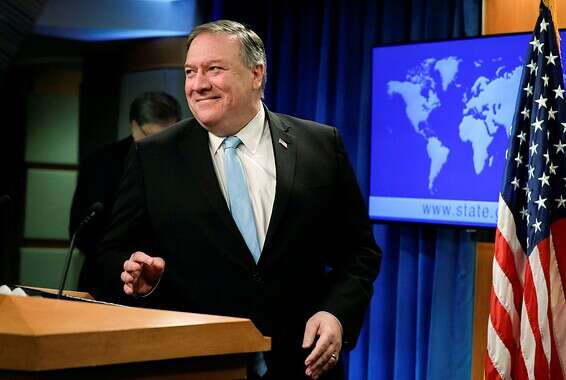The agreement with the Emirates is the tip of the iceberg of a coalition that is reshaping the Middle East and also worries Erdogan • In Gaza and Ramallah, as usual, they miss the opportunity • Interpretation
Abu Dhabi - Open for more alliances
Photo:
GettyImages
US Secretary of State Mike Pompeo is coming to our region today (Monday) to advance two goals that are basically one: mobilize support for the US move to renew international sanctions on Iran, and add more Arab states to the public alliance between Israel and the United Arab Emirates.
From Israel, Pompeo intends to take off for the UAE, to prepare the ground for next month's signing of the peace agreement on the White House lawn, and from there it will continue to neighboring Bahrain and Sudan on the shores of the Red Sea, which may soon join the New Testament.
"Peace in our region will expand to more countries in the not too distant future" // Photo: Knesset Channel
Bahrain was among the first countries to express enthusiastic support for the agreement between Israel and the United Arab Emirates. In Sudan, there is still an internal debate over joining the alliance, a debate that has meanwhile led to the removal of a Sudanese Foreign Ministry spokesman, who is in too much of a hurry to congratulate the finished product. But this move, backed by Transitional Prime Minister Abdel Fattah al-Burhan, is likely to materialize sooner or later - if only because of Sudan's strong desire to drop from the list of pro-terrorism countries.
When Oman and Morocco join this cart, and then, perhaps belatedly, so will Saudi Arabia, it will be an impressive coalition, a conclusive testament to the power of the dramatic Middle East revolution brought about by the Emirate's ruler, Muhammad bin Zayd, saying: recognition of Israel and full normalization of relations with it, without Waiting for a solution to the Israeli-Palestinian conflict.
It is true that many of the components of the new coalition, which also includes Egypt and Jordan, share with Israel the concern and desire to curb Iran's aspirations to acquire nuclear weapons and establish hegemony in the region by undermining the stability of Arab regimes. But it would be a mistake to characterize the new coalition formed in the region only as an axis of action against Iran and its protectorates in the Middle East. The emirate of the Emirates, who seeks to buy his country status as an influential factor in the entire region, sees the takeover of political Islam as an even greater danger from Iran, leading a vision of religious tolerance and social and cultural openness to the wider world.
For these reasons, which Israel can easily connect with, Muhammad bin Zayed is a staunch opponent not only of the Ayatollahs regime in Iran, but also of Turkish President Recep Tayyip Erdogan, who is trying to forcefully establish political Islam in his country, and opposes Qatar, which along with the Turks supports Hamas And hosts in its territory the head of its political bureau, Ismail Haniyeh. He supported Egyptian President al-Sisi when he ousted the Muslim Brotherhood in 2013, led by Muhammad Morsi, and is now working militarily in Libya against Turkish mercenaries who came to help the pro-Islamic regime in Tripoli. He supports Assad because he feared the Islamist nature of the rebels against him.
The "Kassah" with Iran that led the United Arab Emirates to a historic agreement with Israel
For the first time: a joint Shabbat reception from Israel with the Jews of the United Arab Emirates
The UAE is considering purchasing the skimmer interception system
Not all components of the New Testament, led by Muhammad bin Zayed, have already matured into the establishment of full peace and normalization relations with Israel; But the counter-coalition, led by Iran, Turkey and Qatar, is much less cohesive and even further away from becoming a strong alliance. The three countries hold the banner of political Islam, but each has opposing aspirations and goals. Shiite Iran and Sunni Turkey are vying for the aspiration to lead the Islamic world, currently without much success.
Erdogan, as is well known, has megalomaniacal ambitions to renew the days of the Ottoman Empire. Turkey has a severe economic crisis, but that does not stop it - and perhaps actually encourages it - from waging war with Greece and Cyprus, over control of gas deposits in the eastern Mediterranean, and dreaming of re-taking over 13 islands belonging to Greece. In this context, the London Times quotes the head of the Mossad this week, Yossi Cohen, as the one who defined Turkey, led by the adventurous Erdogan, as more dangerous than Iran.
Between the two new coalitions formed in the Middle East, the Palestinians have unfortunately chosen to rely on the support of Iran, Turkey and Qatar, instead of acknowledging the new reality that has been created. After accusing the rulers of the Arab states of treason and "stabbing them in the back", they revealed this week to their great disappointment that the Arab League is also in no hurry to condemn the Emirates for normalizing relations with Israel. Amar Musa, the league's secretary general and former Egyptian foreign minister, was reprimanded by Saib Erekat, an associate of Abu Mazen, after he said that each country has the right to determine the nature of its relations with Israel.

